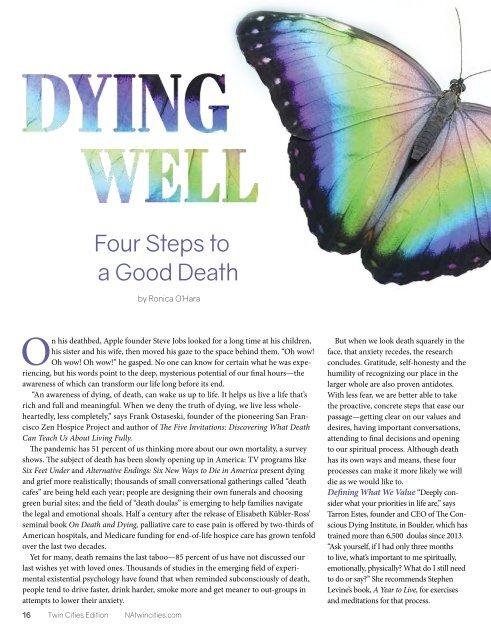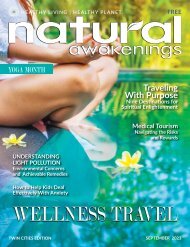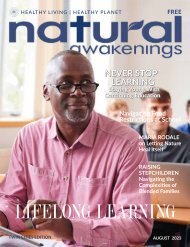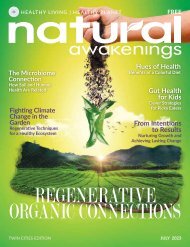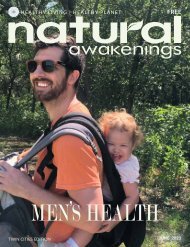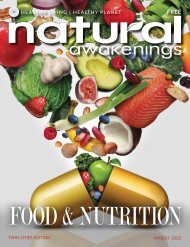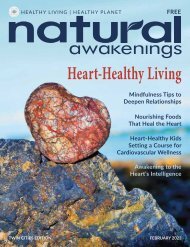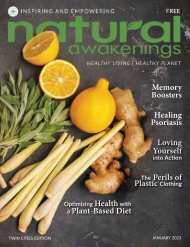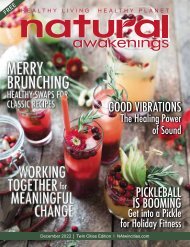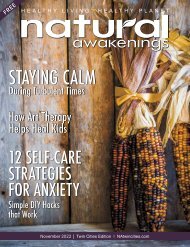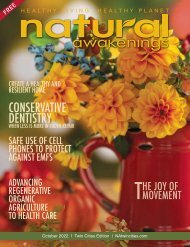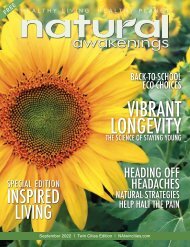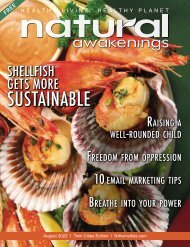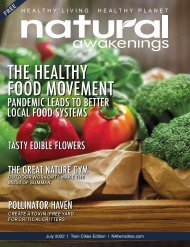Natural Awakenings Twin Cities November 2021
Read the November 2021 edition of Natural Awakenings Twin Cities magazine. This is our annual Mental Health and Well-Being Issue which is focused on Conscious Dying and Brain Health. This month we feature articles on near-death experience, sacred dance, healthy brain strategies, the healing power of hug and topics on boosting kids' learning abilities, reducing cognitive decline, loosing weight with small calorie reduction and so much more! Be sure to check out our local content including News Briefs announcements, Community Resource Guide with providers throughout the metro who can meet your individual wellness needs, and all the happenings in the Calendar of Events. There is additional online-only content that can be found at NATwinCities.com. While you are there, be sure to sign up for our Newsletter and Digital Magazine and continue your reading with our archived articles from local experts.
Read the November 2021 edition of Natural Awakenings Twin Cities magazine. This is our annual Mental Health and Well-Being Issue which is focused on Conscious Dying and Brain Health. This month we feature articles on near-death experience, sacred dance, healthy brain strategies, the healing power of hug and topics on boosting kids' learning abilities, reducing cognitive decline, loosing weight with small calorie reduction and so much more!
Be sure to check out our local content including News Briefs announcements, Community Resource Guide with providers throughout the metro who can meet your individual wellness needs, and all the happenings in the Calendar of Events. There is additional online-only content that can be found at NATwinCities.com.
While you are there, be sure to sign up for our Newsletter and Digital Magazine and continue your reading with our archived articles from local experts.
Create successful ePaper yourself
Turn your PDF publications into a flip-book with our unique Google optimized e-Paper software.
Four Steps to<br />
a Good Death<br />
by Ronica O’Hara<br />
On his deathbed, Apple founder Steve Jobs looked for a long time at his children,<br />
his sister and his wife, then moved his gaze to the space behind them. “Oh wow!<br />
Oh wow! Oh wow!” he gasped. No one can know for certain what he was experiencing,<br />
but his words point to the deep, mysterious potential of our final hours—the<br />
awareness of which can transform our life long before its end.<br />
“An awareness of dying, of death, can wake us up to life. It helps us live a life that’s<br />
rich and full and meaningful. When we deny the truth of dying, we live less wholeheartedly,<br />
less completely,” says Frank Ostaseski, founder of the pioneering San Francisco<br />
Zen Hospice Project and author of The Five Invitations: Discovering What Death<br />
Can Teach Us About Living Fully.<br />
The pandemic has 51 percent of us thinking more about our own mortality, a survey<br />
shows. The subject of death has been slowly opening up in America: TV programs like<br />
Six Feet Under and Alternative Endings: Six New Ways to Die in America present dying<br />
and grief more realistically; thousands of small conversational gatherings called “death<br />
cafes” are being held each year; people are designing their own funerals and choosing<br />
green burial sites; and the field of “death doulas” is emerging to help families navigate<br />
the legal and emotional shoals. Half a century after the release of Elisabeth Kübler-Ross’<br />
seminal book On Death and Dying, palliative care to ease pain is offered by two-thirds of<br />
American hospitals, and Medicare funding for end-of-life hospice care has grown tenfold<br />
over the last two decades.<br />
Yet for many, death remains the last taboo—85 percent of us have not discussed our<br />
last wishes yet with loved ones. Thousands of studies in the emerging field of experimental<br />
existential psychology have found that when reminded subconsciously of death,<br />
people tend to drive faster, drink harder, smoke more and get meaner to out-groups in<br />
attempts to lower their anxiety.<br />
16 <strong>Twin</strong> <strong>Cities</strong> Edition NAtwincities.com<br />
But when we look death squarely in the<br />
face, that anxiety recedes, the research<br />
concludes. Gratitude, self-honesty and the<br />
humility of recognizing our place in the<br />
larger whole are also proven antidotes.<br />
With less fear, we are better able to take<br />
the proactive, concrete steps that ease our<br />
passage—getting clear on our values and<br />
desires, having important conversations,<br />
attending to final decisions and opening<br />
to our spiritual process. Although death<br />
has its own ways and means, these four<br />
processes can make it more likely we will<br />
die as we would like to.<br />
Defining What We Value “Deeply consider<br />
what your priorities in life are,” says<br />
Tarron Estes, founder and CEO of The Conscious<br />
Dying Institute, in Boulder, which has<br />
trained more than 6,500 doulas since 2013.<br />
“Ask yourself, if I had only three months<br />
to live, what’s important to me spiritually,<br />
emotionally, physically? What do I still need<br />
to do or say?” She recommends Stephen<br />
Levine’s book, A Year to Live, for exercises<br />
and meditations for that process.<br />
nikkizalewski/AdobeStock.com


